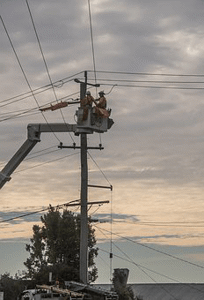The most common cause of power outages is weather-related. In Massachusetts and Rhode Island, this can happen any time of year. Home and business owners can face a Nor'easter with heavy, wet snow and strong winds in the winter or a severe thunderstorm with lightning and high winds in the summer. Both scenarios can cause significant damage, with downed tree limbs and power lines. Oftentimes, power is restored within a few hours. But are you prepared to weather a power outage for longer? Don't let the next outage keep you in the dark. Stay safe with these expert tips.
Power Outage Tips
- Prepare an emergency kit ahead of time. Your kit should include at least 3 days worth of drinking water and non-perishable food for each household member. Additional helpful items to have on hand include a first aid kit, flashlights with batteries, and portable chargers. Find a full list of content suggestions here.
- Stay connected. Charge cell phones and portable devices before an impending storm. Don't forget to make sure the portable charger in your emergency kit is charged as well. Sign up for outage alerts with your utility company and the local authorities.
- Turn down the temperature to the refrigerator and the freezer if you have advance warning of a storm. If the power goes out, the food will stay cold and fresh longer. Keep the doors closed as often as possible to retain the cold air. Food in the refrigerator can stay cold for 4-6 hours and food in the freezer 48 hours.
- Be cautious of carbon monoxide poisoning. Make sure you have working smoke and carbon monoxide alarms! Use generators wisely- do not run them inside the garage or the basement. Keep them outside, at least 10 feet from the home. If you are using a propane space heater, make sure it is labeled for indoor use with safety features. Follow safety warnings and use in a ventilated area. Always turn the heater off before going to bed.
- Keep warm with layers if you don't have a generator or locate a shelter in your community. Close off unused rooms and block drafty doors and windows with plastic or towels. Do not use the stove or oven to heat the home as this poses a fire hazard.
- If you have well water you will want to fill your bathtub with water to use for sanitation purposes.
- Burn candles and use lanterns safely. Maintain 12 inches of space from flammable materials such as clothing and bedding. Avoid carrying them around the house and extinguish them before going to bed. Battery-powered flashlights and lanterns are the safest bet.
Preparing ahead of time will make weathering a power outage much easier. We hope you find these tips useful. If your home experiences fire damage or water damage from a storm, we can help. Our technicians are on the job within hours to make sure that your home returns to normal as quickly as possible. Let our experience work for you. Call (800) 865-5157 or contact us now.


